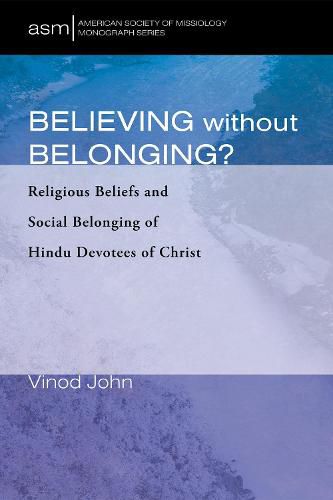Readings Newsletter
Become a Readings Member to make your shopping experience even easier.
Sign in or sign up for free!
You’re not far away from qualifying for FREE standard shipping within Australia
You’ve qualified for FREE standard shipping within Australia
The cart is loading…






This title is printed to order. This book may have been self-published. If so, we cannot guarantee the quality of the content. In the main most books will have gone through the editing process however some may not. We therefore suggest that you be aware of this before ordering this book. If in doubt check either the author or publisher’s details as we are unable to accept any returns unless they are faulty. Please contact us if you have any questions.
This study examines an indigenous phenomenon of the Hindu devotees of Jesus Christ and their response to the gospel through an empirical case study conducted in Varanasi, India. It analyzes their religious beliefs and social belonging and addresses the ensuing questions from a historical, theological, and missiological perspective. The data reveals that the respondents profess faith in Jesus Christ; however, most remain unbaptized and insist on their Hindu identity. Hence, a heuristic model for a contextualized baptism as Guru-diksha is proposed. The emergent church among Hindu devotees should be considered, from the perspective of world Christianity, as a disparate form of belonging while remaining within one’s community of birth. The insistence on a visible church and a distinct community of Christ’s followers is contested because the devotees should construct their contextual ecclesiology, since it is an indigenous discovery of the Christian faith. Thus, the Christian label for the adherents is dispensable while retaining their socio-ethnic Hindu identity. Christian mission should discontinue extraction and assimilation; instead, missional praxis should be within the given sociocultural structures, recognizing their idiosyncrasies as legitimate in God’s eyes and in need of transformation, like any human culture.
$9.00 standard shipping within Australia
FREE standard shipping within Australia for orders over $100.00
Express & International shipping calculated at checkout
This title is printed to order. This book may have been self-published. If so, we cannot guarantee the quality of the content. In the main most books will have gone through the editing process however some may not. We therefore suggest that you be aware of this before ordering this book. If in doubt check either the author or publisher’s details as we are unable to accept any returns unless they are faulty. Please contact us if you have any questions.
This study examines an indigenous phenomenon of the Hindu devotees of Jesus Christ and their response to the gospel through an empirical case study conducted in Varanasi, India. It analyzes their religious beliefs and social belonging and addresses the ensuing questions from a historical, theological, and missiological perspective. The data reveals that the respondents profess faith in Jesus Christ; however, most remain unbaptized and insist on their Hindu identity. Hence, a heuristic model for a contextualized baptism as Guru-diksha is proposed. The emergent church among Hindu devotees should be considered, from the perspective of world Christianity, as a disparate form of belonging while remaining within one’s community of birth. The insistence on a visible church and a distinct community of Christ’s followers is contested because the devotees should construct their contextual ecclesiology, since it is an indigenous discovery of the Christian faith. Thus, the Christian label for the adherents is dispensable while retaining their socio-ethnic Hindu identity. Christian mission should discontinue extraction and assimilation; instead, missional praxis should be within the given sociocultural structures, recognizing their idiosyncrasies as legitimate in God’s eyes and in need of transformation, like any human culture.